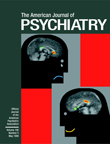Heritability and Social Support
To the Editor: The fascinating studies of Kenneth S. Kendler, M.D., will clearly have a major impact on current ideas about social support. As he begins to elucidate the impact of an individual’s genes on the creation of his or her social environment, it is important to recognize the crucial role of culture as a mediator between individuals and the natural world. His studies from the Virginia Twin Registry leave open intriguing questions about cross-cultural aspects of social support, specifically whether certain social developments in contemporary life might make it increasingly difficult for individuals with particular temperaments to create and sustain robust social networks, as we have argued elsewhere (1). The Roseto studies, demonstrating the effects of changing social structures on the incidence of ischemic heart disease, point to the possible public health implications of these developments (2). We hope that Dr. Kendler’s important work on genetics will not lead to a nihilism about either social changes to make our society more congenial to a broader spectrum of our phenotypes or the possibility of pharmacologic and psychotherapeutic interventions that might help individuals adapt more successfully to the existing social milieu.
1. Schwartz RS, Olds J: Loneliness. Harv Rev Psychiatry 1997; 5:94–98Crossref, Medline, Google Scholar
2. Egolf B, Lasker J, Wolf S: The Roseto effect: a 50-year comparison of mortality rates. Am J Public Health 1992, 82:1089–1092Google Scholar



